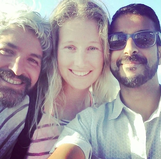 “Who Owns Yoga” is a documentary by Bhanu Bhatnagar, a journalist who also moonlights as a yoga teacher in Doha, Qatar; Micah Garen and Marie-Helene Carleton, award-winning documentary filmmakers and founders of Four Corners Media. The documentary reflects upon the current state of the yoga industry and raises some important questions regarding the future of yoga for all. Whether you are a regular or occasional yoga student or teacher, this debate is relevant to you. Please take the time to read this blog and to watch this engaging documentary. “Who Owns Yoga” is also in the works to be a made into a feature-length independent film, supported by funds raised through Kickstarter. If you would like to support this project, donations can be made by clicking on the link at the end of this blog. _____________________________________________________________________________________________________ Yoga is, today, a multibillion-dollar industry! In the United States alone, the annual amount spent on yoga products totals approximately USD27 billion. That incudes the classes we attend, the equipment we purchase, the clothes we wear and the vacations we take. Compare that to the USD63 billion spent on all sporting goods annually. In the last five years, we’ve seen an 87 percent increase in spending on yoga products. Between 2008 and 2012 yoga participation increased by 29 percent. Industry revenues are expected to increase by 4.8 percent annually through 2019. This statistic includes just the United States and does not account for trends seen in Europe, Central and South America, Asia, Australia and New Zealand, which are also on the rise. It comes as no surprise, yoga is a MAJOR industry! From rather simple beginnings where the practice was passed down from guru to an individual student, to the emergence of yoga ashrams, to the explosion of yoga studios and retreat centers worldwide, how we define yoga, how we practice it, and as teachers, how we teach it is in constant evolution. The rise of yoga styles is also something of interest as yoga gurus emerge from various lineages, some to share their own approaches to the practice of yoga and some because in a competitive market, standing out from crowd is the essence of both gaining a share of the market and remaining relevant in an ever-changing environment. And so, from the days of Iyengar, Ashtanga, Kundalini and Sivananda Yoga, we now see the genesis of much more modern and creative spirits of Aerial Yoga, Voga, Rave Yoga and everything in between. “What is Yoga?” With the ever-grow growing marketing machine behind yoga’s explosive popularity, the question “What is Yoga?” has become the core of many discussions amongst seasoned yogis. Traditionalists or classicalists are quick to judge new and modern forms as “NOT” yoga. A trip to India, the birthplace of yoga, might surprise you however, with its general openness to the definition of yoga. The ancient philosophy behind this practice is in fact accessible to a modern lifestyle and perhaps this ability of yoga philosophy to be understood in its simplicity by all as a journey towards being the best version of yourself as you can be, is what draws millions of people to it. “Is Yoga a Secular Practice?” With roots that date back to approximately 6000 years ago and knowledge gained from the Vedas, the oldest existing written literature in the Indian Subcontinent, yoga shares similar bedrock to the religions of Hinduism, Buddhism, Jainism and Sikhism. But yoga philosophy itself is secular and any overlaps with Hinduism are in a cultural rather than religious context. While most yogis experience yoga in a secular way, Religious activists still claim that yoga is rooted in Hindu beliefs. This point is further discussed in the documentary through interviews with advocates of various perspectives. “Who Owns Yoga?” Currently, yoga enjoys the freedom of expression and of individuality. While Yoga Alliance recommends guidelines and minimum standards for yoga teachers and schools, throughout the world, it is not a regulatory body. In fact, there is no overarching regulatory body that determines what yoga is and isn’t. This is the beauty of yoga. In recent years however, with the likes of Bikram Choudhury, the founder of Bikram Yoga, seeking to patent or copyright yoga sequences, the Indian government is putting together a yoga knowledge database of existing postures to ensure that these stay in the public sphere. But with the practice and the industry changing faster than we can keep up with, what is the future of yoga? The questions above are explored by, Bhanu Bhatnagar, who incidentally also taught his first yoga class in Luang Prabang. In this fourty-minute documentary, Bhanu seeks to find the answers to these questions through interviews with renowned gurus in the East and West, as well as other key players in the Industry. If you are a yoga practitioner, these questions should matter. The future of yoga and our individual right to make yoga our own matters. “Who Owns Yoga” can be watched by following the link below:
Blog post by Julie (juliehana.com)
0 Comments
Your comment will be posted after it is approved.
Leave a Reply. |
Archives
September 2023
Categories
All
|

 RSS Feed
RSS Feed
